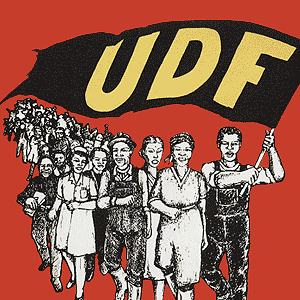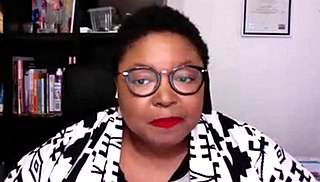Related Research Articles

Tuskegee University is a private, historically black land-grant university in Tuskegee, Alabama. It was founded on Independence Day in 1881 by the Alabama Legislature.

The Democratic Alliance is a South African political party and the official opposition to the ruling African National Congress (ANC). The party is broadly centrist, and has been attributed both centre-left and centre-right policies. It is a member of Liberal International and the Africa Liberal Network. The DA traces its roots to the founding of the anti-apartheid Progressive Party in 1959, with many mergers and name changes between that time and the present. The DA ideologically shows a variety of liberal tendencies, including social liberalism, classical liberalism, and conservative liberalism.

The University of Cape Town (UCT) is a public research university in Cape Town, South Africa. Established in 1829 as the South African College, it was granted full university status in 1918, making it the oldest university in South Africa and the oldest university in Sub-Saharan Africa in continuous operation.

The National Medical Association (NMA) is the largest and oldest organization representing African American physicians and their patients in the United States. As a 501(c)(3) national professional and scientific organization, the NMA represents the interests of over 30,000 African American physicians and their patients, with nearly 112 affiliated societies throughout the nation and U.S. territories. Through its membership, professional growth, community health education, advocacy, research, and collaborations with public and private organizations, the organization is dedicated to enhancing the quality of health among minorities and underprivileged people. Throughout its history, the NMA has primarily focused on health issues related to African Americans and medically underserved populations. However, its principles, goals, initiatives, and philosophy encompass all ethnic groups
Conceived in no spirit of racial exclusiveness, fostering no ethnic antagonism, but born of the exigencies of the American environment, the National Medical Association has for its object the banding together for mutual cooperation and helpfulness, the men and women of African descent who are legally and honorably engaged in the practice of the cognate professions of medicine, surgery, pharmacy and dentistry.
— C.V. Roman, M.D. NMA Founding Member and First Editor of the Journal of the National Medical Association (NMA) 1908

The United States President's Emergency Plan For AIDS Relief (PEPFAR) is a United States governmental initiative to address the global HIV/AIDS epidemic and help save the lives of those suffering from the disease. Launched by U.S. President George W. Bush in 2003, as of May 2020, PEPFAR has provided about $90 billion in cumulative funding for HIV/AIDS treatment, prevention, and research since its inception, making it the largest global health program focused on a single disease in history until the COVID-19 pandemic. PEPFAR is implemented by a combination of U.S. government agencies in over 50 countries and overseen by the Global AIDS Coordinator at the United States Department of State. As of 2023, PEPFAR has saved over 25 million lives, primarily in sub-Saharan Africa.

Nkosazana Clarice Dlamini-Zuma, sometimes referred to by her initials NDZ, is a South African politician, medical doctor and former anti-apartheid activist. A longstanding member of the African National Congress (ANC), she currently serves as Minister in the Presidency responsible for Women, Youth and Persons with Disabilities and is the Chancellor of the University of Limpopo.

The United Democratic Front (UDF) was a South African popular front that existed from 1983 to 1991. The UDF comprised more than 400 public organizations including trade unions, students' unions, women's and parachurch organizations. The UDF's goal was to establish a "non-racial, united South Africa in which segregation is abolished and in which society is freed from institutional and systematic racism." Its slogan was "UDF Unites, Apartheid Divides." The Front was established in 1983 to oppose the introduction of the Tricameral Parliament by the white-dominated National Party government, and dissolved in 1991 during the early stages of the transition to democracy.

Ngozi Okonjo-Iweala is a Nigerian-American economist, who has been serving as the Director-General of the World Trade Organization since March 2021. Notably, she is the first woman and first African to lead the World Trade Organization as Director-General. She was previously on the boards of Danone, Standard Chartered Bank, MINDS: Mandela Institute for Development Studies, Carnegie Endowment for International Peace, Georgetown Institute for Women, Peace and Security, One Campaign, GAVI: Global Alliance for Vaccines and Immunization, Rockefeller Foundation, R4D: Results for Development, ARC: African Risk Capacity and Earthshot Prize plus others. She also previously sat on the Twitter Board of Directors, and stepped down in February 2021 in connection with her appointment as Director-General of the World Trade Organization.

The Elders is an international non-governmental organisation of public figures noted as senior statesmen, peace activists and human rights advocates, who were brought together by Nelson Mandela in 2007. They describe themselves as "independent global leaders working together for peace, justice, human rights and a sustainable planet". The goal Mandela set for The Elders was to use their "almost 1,000 years of collective experience" to work on solutions for seemingly insurmountable problems such as climate change, HIV/AIDS, and poverty, as well as to "use their political independence to help resolve some of the world's most intractable conflicts".

It is thought that multiple ethnic groups in South Africa have long-standing beliefs concerning gender roles, and most are based on the premise that women in South Africa are less important, or less deserving of power, than men. Some view African traditional social organizations as male centered and male dominated. One prevailing caricature of Afrikaner religious beliefs includes a strong emphasis on the theoretically biblically based notion that women's contributions to society should normally be approved by, or be on behalf of, men. Claims are even made of modern sexism and Christianity being introduced into South Africa by the ancestors of the Afrikaner diaspora.

Abortion-rights movements, also self-styled as pro-choice movements, advocate for the right to have legal access to induced abortion services including elective abortion. They seek to represent and support women who wish to terminate their pregnancy without fear of legal or social backlash. These movements are in direct opposition to anti-abortion movements.

Tedros Adhanom Ghebreyesus is an Ethiopian public health official, researcher, diplomat, and the Director-General of the World Health Organization since 2017. Tedros is the first African to become WHO Director-General, receiving an endorsement for the role by the African Union. He played a role in the response to the Ebola virus epidemic, the COVID-19 pandemic, and the 2022–2023 mpox outbreak.

Michelle Ann Williams is a Jamaican-American epidemiologist, public health scientist, and educator who has served as the dean of the Harvard T. H. Chan School of Public Health since 2016.

Precious Moloi-Motsepe is a South African philanthropist and fashion entrepreneur. One of the richest women in South Africa, she started her career as a medical practitioner, specializing in children and women's health. In September 2019 she was elected Chancellor of the University of Cape Town, succeeding Graça Machel, and beginning her ten-year term on 1 January.

Senait Fisseha is an Ethiopian-American physician, lawyer and obstetrician-gynecologist. She specialized in endocrinology at the University of Michigan and received her Juris Doctor from Southern Illinois University. She is currently Vice-President of International Programs at the Susan Thompson Buffet Foundation. She became an advocate for global equity, working with African leaders and institutions during the Covid-19 pandemic. She also chaired the election campaign and transition of Tedros Adhanom, the first African Director General of the World Health Organization, in 2016-17.

Patricia Jannet García Funegra is a Peruvian professor of public and global health at Cayetano Heredia University. She originally trained as a clinician before focusing on research and public health. Her work also focuses on reproductive health, sexually transmitted diseases, and medical informatics. In 2016-17 García was the Minister of Health of Peru. She was the first Peruvian to be elected to the US National Academy of Medicine in 2016.
Jane Manganye is a South African politician who has served as a member of the South African National Assembly since May 2019, and previously from May 2009 to May 2014. She was the deputy speaker of the North West Provincial Legislature from May 2014 to May 2019. Manganye is a member of the African National Congress.
Folake Olayinka, physician and global health leader. Since October 2020, she has served as the United States Agency for International Development's (USAID) Global Immunization lead/STAR Fellow. She also served as Technical and Strategy lead for the COVID19 Vaccine Access and Delivery Initiative Washington DC, United States.

Shabir Ahmed Madhi, is a South African physician who is professor of vaccinology and director of the South African Medical Research Council Respiratory and Meningeal Pathogens Research Unit at the University of the Witwatersrand, and National Research Foundation/Department of Science and Technology Research Chair in Vaccine Preventable Diseases. In January 2021, he was appointed Dean of the Faculty of Health Sciences at the University of the Witwatersrand.

Tlaleng Mofokeng is a South African physician who is the United Nations' Special Rapporteur on the Right to Health. She campaigns for universal health access and HIV care. She was named one of the BBC's 100 Women in 2021.
References
- ↑ "The pandemic has completely shifted marketing initiatives. Here's an example of the right way to successfully adapt". FFW. 24 August 2020. Retrieved 12 November 2020.